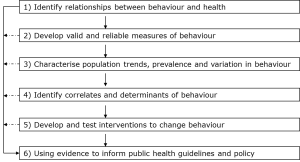
Programme Leader – Dr Esther van Sluijs
Programme news
Read news and blogs about this programme’s research.
Goal and objectives
The overall goal of Behavioural Epidemiology and Interventions in Young People programme is to understand and improve activity and diet behaviour in family and educational settings. The current programme’s objectives are:
- To study impact of health behaviours on proximal, salient outcomes.
- To lead methodological improvement in behavioural epidemiological research.
- To understand health behaviours and their multi-level determinants.
- To develop and test interventions in key settings for young people’s health behaviours.
- To further understanding of the role of implementation and context in intervention effectiveness.
Link with Unit Objectives
This programme serves the following of the Unit Objectives as a main focus:
- To inform, develop and evaluate population-based approaches to improving health
It serves the following Unit Objectives as an element of the programme:
- To develop understanding of mechanisms identified by population-based studies
- To develop new methods, resources and tools for epidemiological and public health research
- To investigate approaches to improving global health, particularly in low and middle income countries
- To build capacity for conducting, understanding and using local, national, and international epidemiology and public health research
- To contribute to the translation of research evidence into policy and practice
Research
Engaging in physical activity and eating a healthy diet during childhood and adolescence is important for obesity, wider cardiovascular risk factors and mental wellbeing during adolescence, as well as longer term physical and mental Evidence suggests that young people’s levels of physical activity are insufficient for health and that dietary habits are generally poor. Identifying ways to promote and maintain healthy physical activity and diet quality in young people is therefore a key public health issue.
 Physical activity and dietary behaviour are complex behaviours, influenced by a combination of factors from multiple ecological levels, including individual, socio-cultural, policy and environmental-level factors. The relative importance of these factors, how they vary across settings and how they interact is still largely unknown. Moreover, our current understanding is largely based on cross-sectional evidence, limiting our ability to draw conclusions about causality and inform intervention development.
Physical activity and dietary behaviour are complex behaviours, influenced by a combination of factors from multiple ecological levels, including individual, socio-cultural, policy and environmental-level factors. The relative importance of these factors, how they vary across settings and how they interact is still largely unknown. Moreover, our current understanding is largely based on cross-sectional evidence, limiting our ability to draw conclusions about causality and inform intervention development.
Our work on health behaviours in young people is set in the socio-ecological model and guided by the Behavioural Epidemiology framework, which proposes a systematic sequence of studies leading to evidence-based interventions directed at populations (see figure, adapted from Sallis et al, Ann Behav Med 2000; Owen et al, Excerc Sport Science Rev, 2010).
The Behavioural Epidemiology programme aims to develop and evaluate interventions to change young people’s activity and dietary behaviour through a thorough understanding of the patterns, consequences, correlates and determinants of the behaviour of interest. Our research covers the early years through to early adulthood.
Programme themes
The work of programme broadly covers two main themes:
1. Understanding the patterns and determinants of physical activity and dietary behaviour in young people
Our efforts focus on quantitative analyses of patterns of and factors influencing change in physical activity in different age groups and across different transitions throughout childhood (e.g. from preschool into primary school, from primary into secondary school, and into adulthood). We complement this with qualitative research into the experiences of population subgroups (e.g. parents, adolescents from disadvantaged backgrounds). This programme is also studying associations between physical activity behaviours and non-physical health outcomes (e.g. psychological health and academic performance), between dietary and physical activity behaviours, and patterns and determinants of dietary behaviour, particularly over the transition to adulthood.
The study of characteristics of physical activity and dietary behaviour, and how it changes, is crucial to understanding when and where interventions may be targeted and what specific behaviours should be considered (e.g., soft drink intake, PE, active travel, fruit & vegetable intake). Most of the existing evidence is limited by the cross-sectional nature of the data available. This makes it impossible to start understanding the cause-and-effect relationship between variables. In this programme, we aim to study the predictors of behaviour change in young people. Using data from in children from different ages (e.g. SWS, SPEEDY, ROOTS), we are establishing the key influences on behaviour change to be targeted in interventions.
Late adolescence to early adulthood is the time of life when overweight and obesity rise the fastest, but we know little about the factors that drive changes in obesity-related behaviours, such as diet and physical activity over this period. Adolescence and early adulthood is a time of rapid personal development and greater autonomy, incorporating many life events such as changes in living situation, education/occupational status, relationships and parenthood. These life events may incorporate changes in social and physical environments and financial resources, identified as determinants of health behaviour. Our research aims to understand the processes and mechanisms that shape behaviour during this period, to determine how best to intervene in this age group to promote establishment of healthy behaviours which persist in adulthood. More about this theme.
Key observational studies the programme is leading or involved in:
- Adolescent Physical Activity During Covid-19 (APAD-C)
- Diet and Eating Behaviours across Early Adulthood Transitions (DEBEAT)
- Family Food Experience Study-London (FFES-L)
- Following Adolescents into Adulthood (FAIA)
- International Children’s Accelerometry Database (ICAD)
- Parental Experiences of Physical Activity
- ROOTS
- Southampton Women’s Survey (SWS)
- SPACE: Studying Physical Activity in Children and their Environment study
- SPEEDY: Sport, Physical activity and Eating behaviour: Environmental Determinants in Young people
2. Development and evaluation of interventions to promote physical activity in young people
Intervention development and evaluation are a core part of the programme. This consists of both the evaluation of existing intervention strategies and the synthesis of existing evidence, as well as the development of novel evidence-based interventions (including digital interventions). For the latter, we use a structured and iterative approach, and undertake explanatory trials to understand the feasibility and effectiveness of specific intervention strategies based on our previous observations. This approach allows for a greater understanding of the causal mechanisms behind behaviour change, and the potential effectiveness of specific components of future, more complex, interventions to be evaluated later.
Results from our and others’ observational research directly inform the development of intervention studies. For example, in the SPEEDY study we showed the importance of family and home environmental factors for primary-school aged children’s physical activity but intervention evidence is inconclusive. We are therefore testing the feasibility an intervention aimed at promoting family physical activity using self-monitoring, action planning and goal setting strategies targeted at the family (FRESH).
Physical activity promotion is relatively understudied in adolescent populations. Our GoActive and CASE studies focus on promoting physical activity through secondary schools. In both studies, interventions were developed with stakeholders and the target population following an extensive programme of work focussed on observational analyses and evidence synthesis. In CASE, we evaluate the feasibility of introducing active lessons into secondary schools, whereas GoActive is a universal intervention targeting physical activity behaviour change through the school’s social environment.
Key intervention projects the programme is leading or involved in:
- Clean Air Zones and School Streets Evaluation
- Creating Active School Environments (CASE)
- Children’s Health in London and Luton (CHILL)
- Development of a digital intervention to promote healthy growth during the first 2 years of life
- Families Reporting Every Step to Health (FRESH)
- GoActive
Programme members
- Tanya Braune – PhD student
- Yanaina Chavez-Ugalde – Research Associate
- Lauren Cross – PhD Student
- Benjamin Hawkins – Assistant Research Professor
- Libby Haynes – PhD Student
- Kathryn Hesketh – Sir Henry Wellcome Postdoctoral Fellow/Assistant Research Professor
- Helen Little – PhD Student
- Karen Ma – Research Associate
- Luiza Ricardo – MRC Postdoctoral Fellow
- Andrea Smith – Assistant Research Professor
- Tom Rance – NIHR Doctoral Fellow/PhD Student
- Hao Tang – PhD Student
- Kateryna Tyzhuk – PhD Student
- Esther van Sluijs – Programme Leader
- Eleanor Winpenny – Visiting Scientist
Recent programme alumni
- Olivia Alliott – PhD Student
- Sofie Armitage – Research Assistant
- Chimweta Chilala – Research Assistant
- Kirsten Corder – Senior Investigator Scientist
- Campbell Foubister – Ph.D. Student
- Catherine Gammon – Research Associate
- Justin Guagliano – Research Associate
- Holly Harris – Research Associate
- Erin Hoare – Visiting Fellow from Deakin University, Melbourne, Australia
- Erika Ikeda – MRC Postdoctoral Fellow
- Stephanie Jong – Research Associate
- Sonja Klingberg – PhD Student
- Rebecca Love – PhD Student
- Rizka Maulida – PhD Student
- Harriet Rowthorn – Research Assistant
- Mairead Ryan – PhD Student
- Rachel Simpson – PhD Student
- Andre Werneck – Visiting student from Universidade Estadual Paulista, São Paulo, Brazil
- Jorinde Westra – Visiting Student (Maastricht University, The Netherlands)
Publications
See all Behavioural Epidemiology and Interventions in Young People publications on the MRC Epidemiology Unit Publications Database.

 MRC Epidemiology Unit
MRC Epidemiology Unit